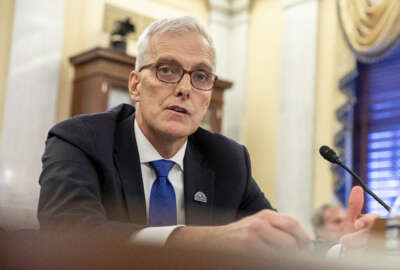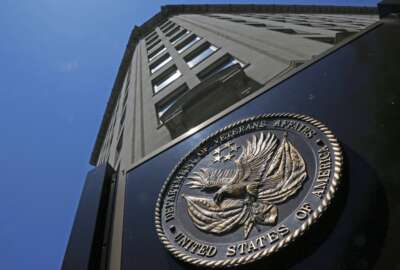VA watchdogs raise alarms about steps missed screening hires with drug felonies
Federal watchdogs have found several gaps in how VA screens candidates for healthcare jobs — including identifying when it hires employees with a drug felony.
The Department of Veterans Affairs is looking to bring new hires in more quickly to build up its healthcare workforce.
But federal watchdogs have found several gaps in how VA screens candidates for health care jobs — including identifying when it hires employees with a drug-related criminal history.
The Government Accountability Office found more than 12,500 Veterans Health Administration employees had “indications of controlled substance-related criminal history.”
In these cases, GAO did not confirm these VHA employees had controlled substance-related felony convictions. However, in a sample of 300 VHA employees, GAO did confirm that 50 of them had one or more controlled substance-related felony convictions.
VHA confirmed to GAO that it did not request a mandatory waiver from the Drug Enforcement Agency for 48 of the 50 employees — and could not verify that had requested waivers for the other two employees.
The DEA requires VA medical centers to get a waiver before hiring anyone with a controlled substance-related felony conviction.
Seto Bagdoyan, the director for audit services within GAO’s Forensic Audits & Investigative Service, said gaps in the security screening process create a “double risk” — to veterans’ care, and also create an opportunity for theft of controlled substances from VA medical centers.
Oversight and Investigations Subcommittee Chairwoman Jen Kiggans (R-Va.) said the VA reported 1,400 instances of controlled substance theft — that’s about 7% of the 20,000 total incidents the DEA reported in 2021.
VA officials, however, told lawmakers they couldn’t immediately confirm if any VA employees — with or without criminal records — were charged with those thefts.
GAO and the VA Office of Inspector General found the system at VHA that keeps track of these onboarding steps has incomplete, inaccurate and not timely data for some hires.
GAO said part of the reason is that VHA modified or deferred certain onboarding steps during the COVID-19 pandemic to bring new hires in more quickly.
The watchdog also found that VHA doesn’t always have reliable data on which onboarding steps new hires have completed. GAO also found that in some cases, VA applicants never received background investigations done in the first place.
VA officials and watchdogs say it doesn’t have enough qualified personnel to run its personnel suitability system
Shawn Steele, the director of health care infrastructure division at the VA OIG, said that VHA staff in multiple instances were in a position to provide direct patient care to veterans without being vetted.
“These issues occurred because neither VA nor VHA dedicated sufficient resources to carry out key internal controls or accomplish program tasks,” Steele said.
New VHA hires are supposed to go through fingerprinting, drug testing and background investigation checks.
These background checks add to VA’s already lengthy hiring process. But Kiggsan said that “even though there has been a lot of pressure to hire as many VA employees as possible,” the background check is a crucial part of the hiring process.
“When the wrong people are hired for the job, veteran safety is put at risk,” she said.
Steele said VA’s staffing shortages extend to its human resources personnel, as well as other employees who are part of the vetting process.
Subcommittee Ranking Member Frank Mrvan (D-Ind.) said the VA not having enough qualified personnel to run its personnel suitability system ” has created an unattainable cycle of staff shortages, causing new staff to enter the VA workforce without the completion of appropriate and required vetting.”
Jessica Bonjorni, VHA’s chief of human capital management, said VHA has about 800 total security specialists and personal security assistants. She said VHA increased its total number of personnel security staff by about 35% over last year.
“We need to be making more improvements swiftly to staff, which is what we’re doing right now. We are staffing up those positions to make sure that we can address the backlogs,” Bonjorni said.
The VA IG found some VA facilities had one adjudicator to screen new hires, despite those facilities have anywhere from 1,200 to 4,700 full-time employees.
“We have to make sure that we have multiple people there for checks and balances,” Bonjorni said.
While VHA is hiring up on security personnel, Bonjorni said VA is not legally allowed to hire contractors to handle adjudicator work.
“We are asking them to make a decision about whether someone is suitable for federal employment. And that’s not typically something we would want to outsource,” she said.
VA currently has two information systems to manage the sustainability determination process —HR Smart and the VA Centralized Adjudication Background Investigation System (VA-CABS).
Daniel Galik, VA’s executive director for identity credential and access management, said the department is moving to a new version of the VA-CABS system in early 2024.
“We are committed to performing those background investigations consistently and properly so that we have a good workforce,” Galik said.
Copyright © 2024 Federal News Network. All rights reserved. This website is not intended for users located within the European Economic Area.
Jory Heckman is a reporter at Federal News Network covering U.S. Postal Service, IRS, big data and technology issues.
Follow @jheckmanWFED






